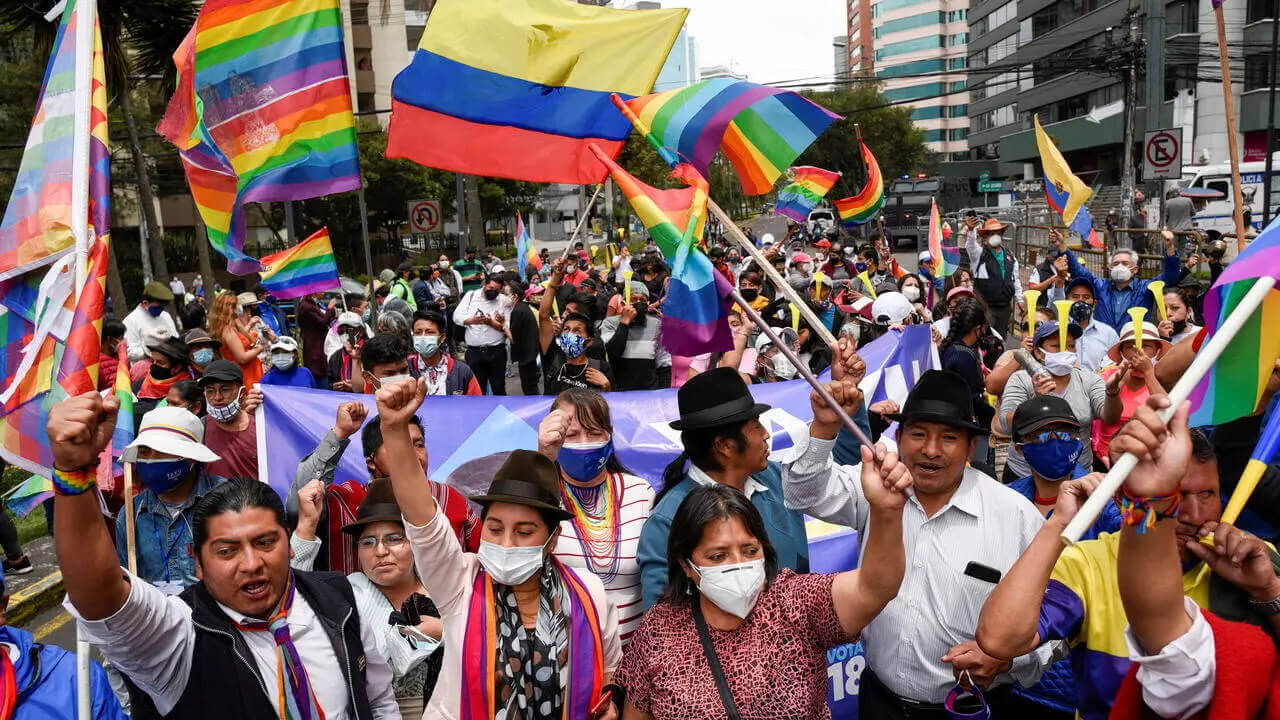Controversy has erupted in Ecuador, as the National Electoral Council (CNE) suspended its recount of votes from the first round of the presidential election, meaning that Leftist candidate Andrés Arauz will face off against the centre-right and religious candidate Guillermo Lasso in a run-off election on April 11. This leaves Indigenous and pro-environment candidate Yaku Pérez, who has alleged that there was “vote tampering”, out of the race.
In the February 7 election, Arauz was the comfortable victor, with 32.71% of the votes. However, Pérez won 19.38% of the votes, compared to Lasso’s 19.74%. Due to a difference of just 33,000 votes, Pérez demanded a recount of votes in 17 out of 24 provinces, which cumulatively account for 45% of the country’s registered voters or six million votes. He argued that the ballots in Manabi, Guayas, and Pichincha, in particular, had not been accurately and fully counted, which is significant because these are areas with a high concentration of Indigenous communities.
In fact, at the time, the election council’s own website noted that 13% of polls statements “show some type of inconsistency”. Against this backdrop, Lasso agreed with Pérez that there must be a full recount in the province of Guayas and a 50% recount in the 16 other provinces requested by Pérez.
The CNE was meant to have reached a consensus decision on the mater by Wednesday, but failed to agree even on the “scope and rules for a partial recount”. The five-member electoral council was not able to come to a consensus decision, due to the fact that two of the members were in favour of a recount, one of them was in opposition, one abstained, and one member was absent. In fact, one of the members of the council, Luis Verdesoto, said that this inability to make a conclusive decision reflects poorly on Ecuador’s “institutional stability and democracy”.
Furthermore, Lasso’s supposed commitment to a free and transparent democracy has also been brought into question. On Monday, the Creating Opportunities (CREO) candidate withdrew from the agreement he made with Pachakutik candidate Pérez on a recount. After coming to an agreement last Friday, on Sunday he said that conducting a 50% recount in 16 provinces would be “waste of time”.
In response, Pérez alleged that Lasso had struck some sort of illicit agreement with the CNE, asking, “Why are you backing out of the vote recount? What did you and the CNE do? Why you don’t want Ecuador to know? For you, politics is a game.”
Following the CNE’s decision to suspend the recount, Pachakutik’s national coordinator, Marlon Santi, declared, “We are not going to allow them to steal our victory and our right to participate in the second electoral round and achieve victory against the candidate who represents the return of corruption and authoritarianism.” In fact, Pérez’s supporters began a democracy march on Wednesday that is expected to reach the capital city, Quito, next week.
Pérez himself said, “They are not going to defeat us, they are not going to annihilate us, the resistance continues. Today (the electoral council) has just made a decision that is left in limbo.”
This sorry episode in Ecuador seems to suggest the silencing of an Indigenous candidate, which would be in keeping with tradition in the country.
Under President Rafael Correa, who was in power from 2007 to 2017, Ecuador expanded oil and mineral projects that negatively impacted Indigenous communities by harming the environment, encroaching on their territories, and failing to adequately compensate them for projects on their land.
The front-runner in the election, Arauz, is considered to be a protégé of Correa. Moreover, while Lasso is by no means a ‘Correista’, he is popular among the country’s elite due to his vast experience in the business and banking sectors and his free-market approach. In contrast, Pérez is an Indigenous and pro-environment candidate who seeks to ban industrial mining, safeguard the environment, hold human rights violators accountable, and protect the country’s Indigenous communities. Therefore, this latest decision by the CNE is sure to even further disenfranchise and infuriate the nation’s Indigenous people, who have been intentionally excluded from the nation’s political and economic discourse once more.
Ecuador Controversially Suspends Vote Recount, Angering Indigenous Communities
Ecuador’s National Electoral Council suspended its recount of votes from the first round of the presidential election, drawing the ire of Indigenous and pro-environment candidate Yaku Pérez.
February 19, 2021

IMAGE SOURCE: SANTIAGO ARCOS / REUTERSIndigenous communities have regularly been excluded from political representation in the country.
